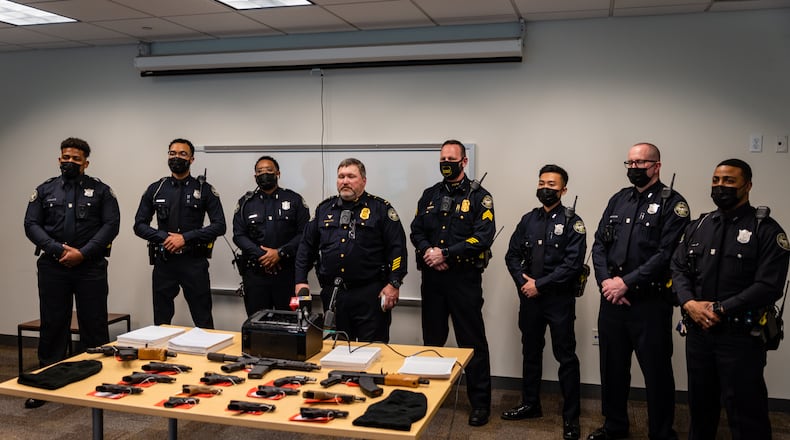The numbers seem almost impossible: Between Jan. 1 and mid-February, a new unit of six Atlanta officers and two supervisors has conducted more than 2,300 traffic stops, according to police officials.
The department is touting the success of its new Tactical Traffic Crime Reduction Unit (TTCRU) in Zone 5, an area that includes downtown and Midtown. The TTCRU’s goal is to reduce thefts from cars in the area by making more frequent traffic stops, according to Lt. Jeff Childers.
In the first six weeks of this year, the unit has issued 1,100 citations and made 23 gun-related arrests, he said.
The key to the unit’s success so far, Childers said, is that they “go beyond the stop.”
“We may pull you over for an expired tag, cellphone, tinted windows ... just a basic charge,” Childers said. “But during the process of that traffic stop, we discover much more.”
Credit: Henri Hollis
Credit: Henri Hollis
Childers said the unit has come across several cases in which a car had multiple passengers who were armed.
One of the most serious cases involved a black Mercedes-Benz GT63 that was pulled over Jan. 27 for having a window tint that was too dark, according to a police report obtained by The Atlanta Journal-Constitution. The stop led to the arrest of two men and the confiscation of multiple guns and drugs, along with four boxes filled with paper stock used for printing checks, a printer and a shredder, the report said. The department’s major fraud unit is now investigating the case.
In another potential fraud case, Childers said a traffic stop led to the discovery of 40 sealed boxes of Apple Airpods, the wireless Bluetooth headphones that retail for more than $150 a pair.
“Most of them had the same serial number,” Childers said of the Airpods, “So we believe they might be counterfeit and we have someone looking into that.”
The sheer volume of stops undertaken by this small unit has inevitably raised questions.
When asked whether the traffic stops have caused concerns about racial profiling, Childers said that only the actions of the driver are taken into consideration.
“Many times the officer may not even know what the drivers’ races are,” Childers said.
There is also the question of workload on officers who are already stretched thin. But the number of traffic stops, anywhere from 10 to 25 per officer per day, is not taking a toll on his unit, Childers claims.
“These guys are highly motivated and they’re having a really good time doing it,” he said. “You know, making the space uncomfortable for criminals is giving back to the community, and they want it to be as safe as possible in the place where they work and live and visit.”
The TTCRU has also made an impact in an area that’s become a focus of city and state officials in the past year: street racing. Childers said the unit has made arrests based on charges like illegal car exhausts and requested warrants for street racers based on their car registration information.
“Everybody’s working on street racing,” Childers said. “Obviously, we have people permanently assigned to those details, but that is a statewide problem that everybody’s working on.”
Though the TTCRU is still in its infancy, the promising results could lead to the formation of similar units in other zones. There have not been discussions among APD leadership about expanding the program, but Childers said his team has had internal conversations about creating a template that could be exported to other zones.
For their part, the officers in the TTCRU will continue making dozens of traffic stops, day in and day out. The unit believes that even when stops do not result in charges or arrests, the increased activity is having a positive effect.
“You can see from the numbers, but we don’t write a ticket for every stop,” Childers said. “We’ve seen where auto theft, the break-ins, the entering auto cases — they’re moving. They’re diminishing in the areas where we’re putting our efforts. We’re really trying to occupy these spaces where the crime has an uptick.”
About the Author
Keep Reading
The Latest
Featured


